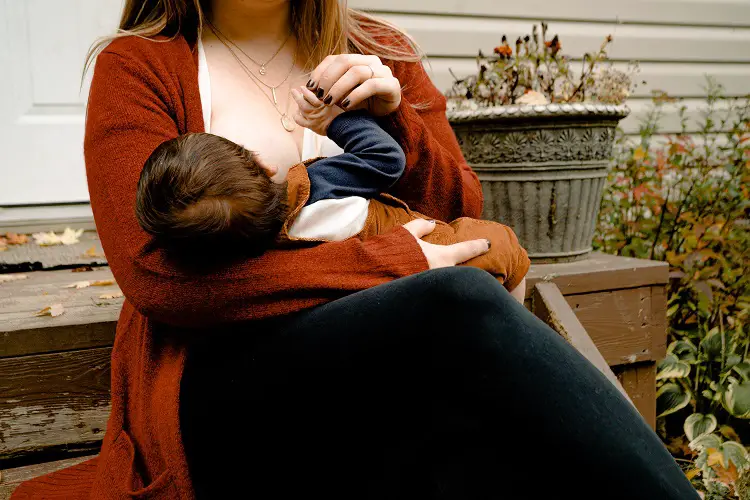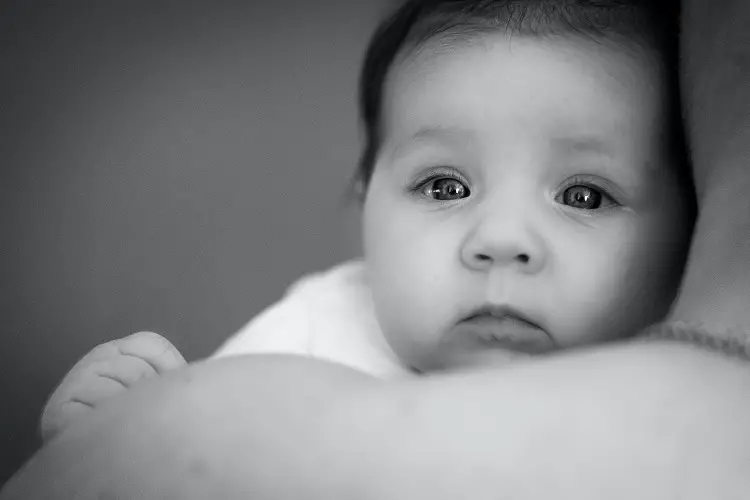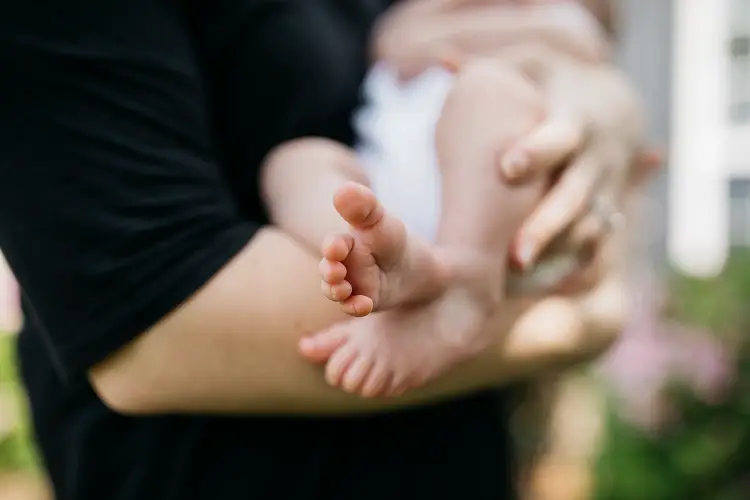There will always be someone who thinks you breastfed for too long or too short a period. But, there isn’t a right or wrong way, and no one should judge you on the length of time you decide to breastfeed.
How long you decide to breastfeed your baby is entirely up to you. It is estimated that about 80% of women in the US start breastfeeding their newborns after birth. But only 30% continue to breastfeed for the recommended amount of time.
While experts have their recommendations, others have their opinions, but only you along with your doctor and your partner can decide what works for your family.
How Long Did You Breastfeed Your Baby?
Know that any amount of breastfeeding or breast milk that you can give to your baby is beneficial. Even a small amount of colostrum, the first breast milk, is valuable to your baby.
That first breast milk is filled with more than just nutrition and it contains antibodies and other immune properties.
Therefore, even if you decide to breastfeed for a little while in the beginning, early breast milk can help protect your newborn from illnesses such as diarrhea, ear infections, and respiratory infections.
However, if you continue to breastfeed past the newborn stage, it’s even more beneficial. Breastfeeding can lower the baby’s risk of developing asthma, allergies, diabetes, and certain types of cancer.
It may also help you lose your pregnancy weight faster while decreasing your risk of ovarian and breast cancer.
Read on to know more here about what breastfeeding provides at the different ages and stages of your baby’s life.
If You Breastfeed Your Baby For Just A Few Days
Your baby must have received your colostrum or early milk at this stage. By providing anti-infective factors (eg antibodies) and the food his brand-new body expects, breastfeeding gives your baby his first and easiest ‘immunization’ and helps get his digestive system working smoothly.
As you know breastfeeding is how your baby expects to start and she is born with the instincts to help guide this process. It also helps your own body recover from birth.
Given how little it takes to offer it, and how very much your baby stands to benefit, it is good to breastfeed for at least a day or two, even if you plan to bottle-feed after that.
If You Breastfeed Your Baby For 4–6 Weeks
You will have eased your baby through the most important part of her infancy. Newborns who are not breastfed are much more likely to get sick or be hospitalized and have an increased risk of SIDS than breastfed babies.
While after 4–6 weeks, you’ll probably have dealt with any early breastfeeding concerns. Remember, make a serious target of breastfeeding for a month, call the Breastfeeding Helpline, or an international board-certified lactation consultant (IBCLC) if you have any concerns.
If You Breastfeed Your Baby For 3–4 Months
Her digestive system will have matured a great deal, and she will be much better able to tolerate the foreign substances in the formula. Giving your baby nothing but breastmilk for the first 6 months will help protect her against any infections (eg ear, respiratory and gastrointestinal).
If You Breastfeed Your Baby For 6 Months
Breasting your baby without adding any other food or drink will help ensure good health throughout your baby’s first year of life. Also, it reduces your child’s risk of infection, and reduce your own risk of breast cancer.
It is important to note that, frequent exclusive breastfeeding during the first 6 months and if your periods have not returned, provides 98% effective contraception. The NHMRC (National Health and Medical Research Council) and WHO (World Health Organization) recommend waiting until about 6 months to start solids.
If You Breastfeed Your Baby For 9 Months
If you breastfeed your baby for 9 months, you will have nourished her through the period of her fastest and most important brain and body development on the food that was designed for her.
It might be fairly easy to wean at this age … but then, so is breastfeeding. So if you want to avoid weaning at this early stage, know that, from the start, you breastfeed willingly to provide comfort, not only just to provide food.
If You Breastfeed Your Baby For One Year
If you breastfeed your baby for 1 year, you can avoid the expense of formula. Her one-year-old body may handle most of the family foods your family consumes. Many of the health advantages this year of breastfeeding has given your baby will last her whole life.
She will be less likely to need orthodontic treatment and have a reduced risk of some childhood cancers such as leukemia.
Note that NHMRC (National Health and Medical Research Council) recommends you breastfeed for a year, or for as long as mother and baby desire because it helps ensure normal nutrition and health for your child.
If You Breastfed Your Baby For 18 Months
Breasting your baby for up to 18 months, provides nutrition, comfort, and illness protection for your baby, especially at a time when the illness is common in weaned babies. Your baby is probably well comfortable on family foods too.
She has had enough time to form a solid connection with you. This is a healthy starting point for her growing independence where she is old enough to work with you towards the weaning process, at a pace that she can handle.
Read Also: Is It Ok If I Breastfeed My Husband?
How Long Is Too Long To Breastfeed

There is not a given age at which breastfeeding must end. Depending on how you and your child feel, experts agree that you should continue to breastfeed for as long as you find that it works for you.
Provided that you begin to add complementary foods to your child’s diet as she grows, breastfeeding can continue for 2 years, 3 years, or even longer.
In older children, breast milk still provides them with additional nutrition for a complete, healthy diet. It also continues to provide antibodies and immune properties that help older children fight off infection, disease, and illness.
Breastfeeding your baby will continue to be beneficial for however long you decide to breastfeed him/her. So, ultimately it’s up to you and your partner to determine how long is too long as your child grows.
Read Also: Baby Addicted To Breast Milk
Weaning
To wean your baby simply means you breastfeed your baby less or you stop breastfeeding him or her. This naturally starts when your baby begins to eat solid foods. Your baby will start to breastfeed less during that time.
When Do I Start Weaning
Talk with your healthcare provider about the best time to wean your baby. The following are general guidelines:
- Introduce Solid Foods At About 6 Months: Your baby may show signs that he or she is ready to start eating solid foods. Your baby may watch others with interest when they are eating and reach for the food. She must be able to hold her head up and sit in a feeding chair.
- Talk To Your Healthcare Provider About The Formula: Your baby will need nutrients from breast milk until he/she is at least 12 months of age. You’ll need to bottle-feed him or her formula if you decide to stop breastfeeding your baby before he/she is 12 months old. Finally, ensure the formula is fortified with iron.
Why You Should Avoid Early Weaning?
- Early Weaning May Cause Digestive Problems: Your baby’s digestive system is not ready for solid food until he or she is about 6 months old. He or she may also have an increased risk of celiac disease. This is when the body cannot process gluten, a substance found in wheat and other grains.
- Early Weaning May Increase Your Baby’s Risk Of Skin Problems: An example is eczema. Eczema causes skin swelling, redness, and itching.
- There are Chances That Your Baby Might Be At Risk Of Increased Weight Gain Later In Life: Breastfeeding allows your baby to stop feeding when he or she is full. Babies who drink from a bottle may drink more than they required because they are encouraged to drink the entire water in the bottle. It is important to note that some baby formulas have more calories than breast milk.
- Your Baby May Develop Nutrition Problems: Weaning your baby early may cause your baby to drink less breast milk depriving her of the necessary nutrients needed by the body for her growth and development.
What Can Lead To Early Weaning?

You may want to wean your baby from breast milk early if you are experiencing some problems. Most of these problems can be fixed to allow breastfeeding to continue. Talk with your healthcare provider if you are thinking about weaning early for any reason.
- When Start Developing Any Unusual Breast Problems: It is ok to experience sore nipples during the first 1 to 2 weeks of breastfeeding. After the first week of breastfeeding, this discomfort should decrease. It should not hurt to breastfeed. You may also develop a plugged duct. This is a milk duct in your breast that is blocked. This may cause tender lumps in your breast. Engorgement may occur 3 to 5 days after you give birth. The breasts become swollen and painful. This can make breastfeeding uncomfortable. Talk to your health a practitioner if you develop any of these breast problems.
- Are You Feeling That Your Breast Milk Supply Is Too Low: You may be thinking that your breasts are not making enough milk to satisfy your baby. Most mothers do make enough milk for their babies, even if they think they do not.
- You Do Not Have Enough Support: It may be hard to keep breastfeeding if you do not have support. Talk to your partner, family, and friends about the benefits of breastfeeding.
- You Need To Return To Work: Breastfeeding may be hard for women in the workplace. Always check with your boss about providing time to nurse or express milk at work.
- Your Baby Has A Health Problem: It is difficult to breastfeed your baby when he/she has health problems. This may occur if your baby is in the hospital for a while after birth.
Read Also: How long does it take for breast milk to fill back up?
Wind-Up
Having answered the question “How long did you breastfeed” also know that breastfeeding is a personal decision and there isn’t a right or wrong amount of time. So, go ahead and do what’s best for you and your child.
Don’t be bothered or feel guilty if someone says you didn’t breastfeed long enough or you breastfed too long. Have confidence in your choice and the knowledge that you breastfed just the right length of time for you, your child, and your unique situation.
Did this article help you? Kindly share it with any mom who’s wondering how long to breastfeed her baby.
